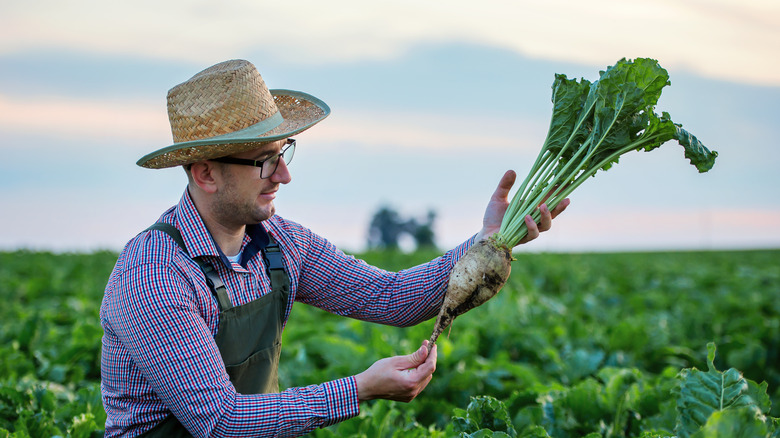Most Of The World's Sugar Beets Come From This Country
When you think of beets – if you ever think of beets – you probably imagine a crimson root plant used in salads and to safely dye foods. But there are other kinds of beets in the world outside of the red root, one of which we don't think much about but use every time we add sugar to our cake or molasses to our cookies.
The sugar beet seems to go regularly overlooked by the public. Perhaps some of us are still under the misconception that sugar cane is the only source of sugar in the world. But in the 18th century, German chemist Andreas Marggraf discovered that the sugar beet produces the same kind of sugar as the sugar cane, and today they account for 32% of the world's table sugar (via Frontiers for Young Minds). According to the Alternative Field Crops Manual, sugar is stored in the root to use as an energy boost during the winter, but we harvest the beets before the cold season and extract the sugar that was intended for its survival. But where do most of the beets produced in the world spend their winters?
Ask the neighbor for a cup of sugar
Russia is all too often imagined as a desolate land of frost and ice, but in reality, it grows a lot of food. In 2017, the country grew 16% of the world's sugar beets, making it the biggest producer, as reported by the FSA Accelerator. A 2022 article by IDN-InDepthNews reports that Russia still leads the pack, producing 14% of the global total. During the last few decades, Russia's agricultural industry has been expanding due to advances in technology. Because of this, it now controls much of our global food production.
The juice from the sugar beets can be used to make white and brown sugar as well as molasses (via Business Standard), so odds are if you're using sugar as a sweetener in your tea, jam, or bread, a good portion of the sweet stuff probably came from a beet. Sugar beets are grown in North America as well, but Russia widely outpaces the New World's production. So if Americans want to keep sugar on the table, they might have to ask their neighbor to the east for some beets.

